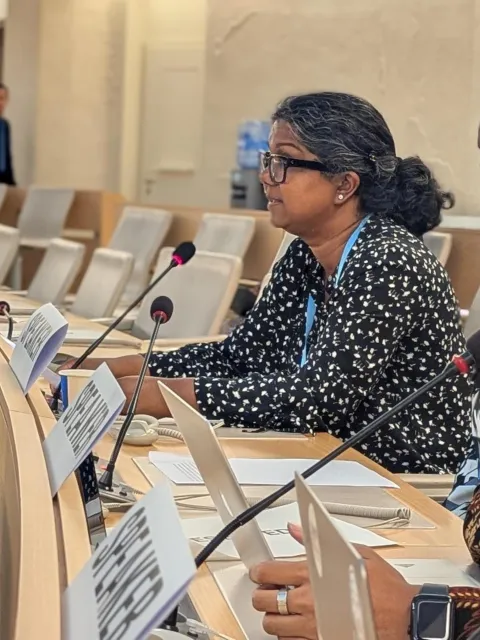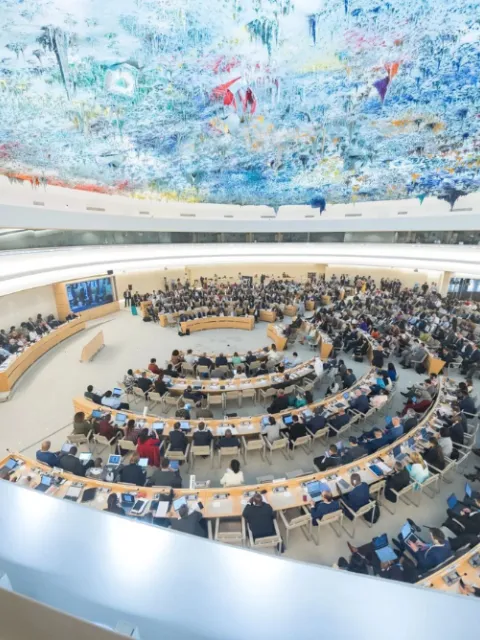Key highlights from the 77th World Health Assembly
Several key discussions and resolutions at the 77th World Health Assembly (WHA) touched upon issues that also affect cancer control, notably resilient health systems, determinants of health, antimicrobial resistance, and ensue the continuity of essential cancer services during emergencies.

Prof. Jeff Dunn AO, President of UICC, along with the UICC team, met with Hon. Mark Butler MP, the Minister for Health and Aged Care of Australia. From left to right: Dr Sonali Johnson, Head of Knowledge, Advocacy and Policy at UICC, Hon. Mark Butler MP, Prof. Jeff Dunn, and Dr Yannick Romero, Senior Knowledge and Advocacy Manager at UICC.
HIGHLIGHTS
- Discussions at the WHA highlighted the importance of addressing determinants of health, such as tobacco and alcohol, and financial protection to improve equity in access to cancer care.
- UICC organised side-events on lung cancer, antimicrobial resistance, and palliative care
- UICC held meetings with the Minister for Health and Aged Care of Australia and Assistant Minister for Public Health Initiatives and Projects of Egypt.
The 77th World Health Assembly (WHA) is currently convening in Geneva, from 27 May to 1 June 2024, with representatives from 194 countries. A major highlight of the assembly has been the adoption of the Fourteenth General Programme of Work (GPW14), a strategic plan for 2025-2028 with a budget of USD 11.1 billion, which aims to build resilient, future-ready health systems.
Resilient health systems are crucial for effective cancer control. The GPW14 also includes several joint outcomes – specific, agreed-upon objectives that multiple stakeholders, including WHO Member States, aim to achieve collectively – that directly impact cancer care.
These cover issues such as improving equity in access to quality services for noncommunicable diseases (NCDs), enhancing immunisation coverage with a focus on HPV catch-up vaccination, and reducing financial barriers to healthcare and out-of-pocket health expenditures, especially for the most vulnerable, which is vital for cancer patients who often face high treatment costs.
In his opening address, the Director-General of The World Health Organization (WHO), Dr Tedros Adhanom Ghebreyesus also referenced cancer, celebrating successes in treatment and prevention, and highlighting the importance of continued efforts and collaboration.
The Assembly further discussed the importance of addressing social and other determinants of health, such as tobacco and alcohol, which are key risk factors for noncommunicable diseases such as cancer.
Universal health coverage (UHC) was also a central theme at the WHA, and a vital one for cancer control. Reports indicate that progress towards UHC is off track, necessitating redesigns of current strategies. The Assembly emphasised the need for greater community engagement and attention to social and other determinants of health to achieve UHC.
Several Member States, including Cambodia, Lebanon, and Mexico, made comments on cancer, emphasising its global impact.
The WHA also addressed the development of a pandemic agreement and amendments to the International Health Regulations (IHR). These efforts aim to prevent a repeat of the global impacts of the COVID-19 pandemic and include provisions for the continuation of essential services. For cancer advocates, this could provide a valuable tool for advocate for the inclusion of essential cancer services in national pandemic prevention, preparedness and response strategies. This could potentially set legally binding targets for governments to ensure the continuity of cancer services during crises. Despite lengthy negotiations, agreement on the pandemic accord hasn't been reached yet and it is likely that negotiations will continue over 2024.
Other resolutions yet to be discussed that are of interest to the cancer community include social participation in health, which involves how governments should engage communities, caregivers, and patient groups, and climate change and health, which addresses health impacts through mitigation and adaptation strategies.
Climate change and health are other prominent topics at the Assembly. The proposed resolution on Climate Change and Health highlights the myriad ways in which climate change impacts health. The resolution calls for integrating climate considerations into health monitoring systems, developing national plans to address climate-related health vulnerabilities, and tackling health risks through mitigation (reducing emissions and air pollution), adaptation (safeguarding healthcare facilities), and supporting countries globally using loss and damage mechanisms. This is crucial as environmental factors significantly influence cancer incidence and outcomes. The resolution will be presented this week for adoption.
The WHA also saw the launch of the WHO Tracker, a digital platform developed by the People's Health Movement (PHM) to provide independent analysis of WHO and other global health meetings. This tool offers critical insights and commentaries on WHA agenda items, helping stakeholders navigate and influence global health policies, including those related to cancer.
UICC advocacy efforts
Prof. Jeff Dunn AO, President of UICC, along with the UICC team, met with Hon. Mark Butler MP, the Minister for Health and Aged Care of Australia, and Dr Mohammed Hassany, Assistant Minister for Public Health Initiatives and Projects of Egypt, and their respective teams. They discussed a wide range of topics, including lung cancer, tobacco control and youth vaping, the upcoming UN High Level Meeting on AMR and the threat of AMR for cancer control, and the need for more comprehensive cancer strategies at the national level that go beyond primary health care.
The UICC team also engaged with the Netherlands, France, Germany, Kenya, Columbia, Mexico, Brazil, the US, China and the UK on priority cancer and NCD issues, including pandemic preparedness, air pollution and health, and AMR.
UICC side-events: lung cancer, AMR, and palliative care
A roundtable discussion on lung cancer, co-hosted by UICC and Devex, highlighted the importance of global leadership in elevating lung cancer on the health agenda. The session reviewed new evidence on early detection and care, and shared progress from national screening initiatives in the UK, Australia, and Egypt.
UICC also organised a side event on antimicrobial resistance (AMR), a significant threat to effective cancer treatment and care, in collaboration the Norwegian Cancer Society, the Swedish Cancer Society, and ReAct. Discussions focused on building stronger systems for surveillance, sustainable access to antibiotics, and the rational use of diagnostics, as well as highlighting innovative approaches, collaborative networks, and securing commitments for concrete actions and funding to address AMR.
With 2024 marking 10 years since WHO passed the only stand-alone resolution on palliative care. UICC has co-hosted with the World Hospice Palliative Care Alliance a side event to discuss the slow progress in LMICs and explore ways to expedite access. Key topics include evaluating policy integration, overcoming resource and training barriers, and the importance of multi-sectoral partnerships for advancing palliative care globally.
The WHA is the highest governing body of WHO, setting global health agendas. It remains crucial in shaping health policies worldwide. For details on the outcomes of discussion and resolutions, please visit the WHA newsroom.
Last update
Friday 31 May 2024
